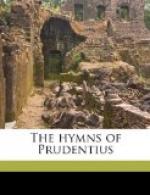GEMELLA DORMIT IN PACE
but later (cf. l. 171), they were engraved on small marble slabs.
25 In both thought and language this stanza, as
vii. 16 et seq., is
evidently reminiscent
of Horace (Sat. 2, ii. 77): Quin corpus
onustum, etc.
“The
Body, too, with Yesterday’s excess
Burthened
and tired, shall the pure Soul depress,
Weigh
down this Portion of celestial Birth,
This
Breath of God, and fix it to the Earth.”
(Francis).
51 Boldetti, in his work on the Catacombs (lib.
i. cap. 59), says
that on many occasions,
when he was present at the opening of a
grave, the assembled
company were conscious of a spicy odour
diffusing itself from
the tomb. Cf. Tertullian (Apol. 42):
“The
Arabs and Sabaeans knew
well that we consume more of their precious
merchandise for our
dead than do the heathen for their gods.”
57 Prudentius’ firm faith in the resurrection
of the body is also
nobly expressed in the
Apotheosis (ll. 1063 et seq.):—
“Nosco meum in Christo
corpus resurgere; quid me
Desperare iubes? veniam, quibus ille revenit
Calcata de morte viis: quod credimus
hoc est.
* * * * *
Pellite corde metum, mea membra, et credite vosmet Cum Christo reditura Deo; nam vos gerit ille Et secum revocat: morbos ridete minaces: Inflictos casus contemnite; tetra sepulcra Despuite; exsurgens quo Christus provocat, ite.”
Translation.
“I know in Christ my body shall arise;
Why bid me, then, despair? for I shall go
By that same path whereby my Lord returned,
Death trodden ’neath His feet: this is my creed.
Banish, my limbs, all terror; and believe
That ye with Christ our God shall yet return;
He beareth you and with Himself recalls.
Laugh at the threats of sickness; scorn the blows
Of fate; despise the horrors of the tomb;
And fare ye where the risen Christ doth call.”
61 The poet expresses as a duty owed to Christ
Himself the heathen
obligation of casting
three handfuls of earth upon a body discovered
dead.




